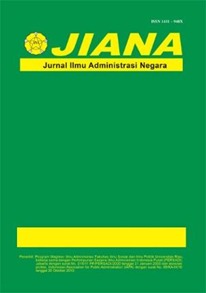THE COORDINATIVE ROLE OF BAPPEDA IN SOCIAL DEVELOPMENT BUDGET MANAGEMENT: A CASE STUDY OF PADANG CITY
DOI:
https://doi.org/10.46730/jiana.v22i3.8256Abstract
Indonesia's fiscal decentralization era demands effectiveness from regional planning institutions in managing social development budgets; however, gaps remain in optimal BAPPEDA implementation, particularly in cross-sectoral coordination, human resource capacity limitations, and weak impact-based monitoring systems. These gaps require responsive budget governance innovations that address societal social needs. This study aims to comprehensively analyze the role of Padang City BAPPEDA in managing development budgets directed toward improving community social welfare, focusing on planning mechanisms, budget allocation processes, program effectiveness, and strategies for overcoming obstacles. The research employs a qualitative approach with an instrumental case study design of Padang City BAPPEDA as the unit of analysis, involving purposive sampling of BAPPEDA structural-functional officials, related regional work units (OPD), and community representatives, along with methodological triangulation of in-depth interviews, participatory observation, and document analysis analyzed using Braun and Clarke's six-phase thematic analysis framework. Findings demonstrate that BAPPEDA successfully executes its coordinative role as architectural governance through an integrative, collaborative governance model, reflected in poverty rate reduction from 4.17% to 4.06%, increased social program budget utilization from 76% to 92%, stakeholder engagement index of 4.2 on a scale of 5, with 78% of social programs originating from participatory Musrenbang proposals. The research contributes theoretically to the development of collaborative governance by conceptualizing BAPPEDA as an institutional bridging mechanism, providing best practice models for the implementation of evidence-based budgeting, and generating analytical frameworks for measuring coordination effectiveness that can be adapted for the institutional capacity development of other regional planning agencies.
Downloads
Published
How to Cite
Issue
Section
License

This work is licensed under a Creative Commons Attribution-NonCommercial-ShareAlike 4.0 International License.
The copyright of the received article shall be assigned to the journal as the publisher of the journal. The intended copyright includes the right to publish the article in various forms (including reprints). The journal maintains the publishing rights to the published articles.
Authors are permitted to disseminate published articles by sharing the link/DOI of the article at the journal. Authors are allowed to use their articles for any legal purposes deemed necessary without written permission from the journal with an acknowledgment of initial publication to this journal.

Jurnal Ilmu Administrasi Publik is licensed under a Creative Commons Attribution-NonCommercial-ShareAlike 4.0 International License.




